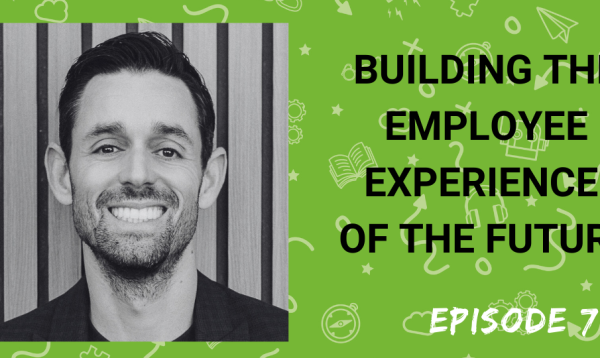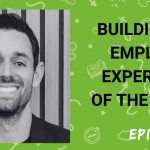The popularity of moving recruitment in house continues to grow and is now something that is happening across all types of businesses whether they are large corporates, SMEs or high growth start ups. Setting up a in house recruitment function can be a learning experience both for the company and for the recruiters involved as the reality is often much more complex than the theory.
My guest this week is Nick Yockney Head of People for Property Partner, a property crowdfunding platform. Nick has set up two new in house recruiting functions since making the transition from agency recruiter to in house recruiter and is very open and honest about his experiences.
In the interview we discuss:
• The Difficulties for recruiters when moving from agency to in house
• The motivations businesses might have for bringing recruitment in house
• The importance of understand the rhythm of the business and the value an in house function can add if it does this
• The dangers of over-promising
• Thinking strategically while realistically assessing the tools you have
• Function over fashion in recruitment technologies.
Nick also tells us what has surprised him most about moving in house, the tools he finds most useful and his views on the future.
Subscribe to this podcast in iTunes
Transcript:
Matt Alder [00:00:00]:
Support for this podcast comes from Guardian Jobs. Guardian Jobs provides a range of recruitment and branding solutions with access to a monthly audience of 149 million users. They offer a range of innovative talent attraction and content options ranging from the latest programmatic and behavioral targeting to developing content partnerships on themes such as the future of work and women in tech for organizations like Deloitte and Sky. To find out how they can help you, visit recruiters.theguardian.com that’s recruiters.theguardian.Com.
Matt Alder [00:00:58]:
Hi everyone, this is Matt Alder. Welcome to episode 52 of the Recruiting Future podcast. The popularity of moving recruitment in house continues to grow across businesses of all sizes. Setting up an in house recruiting function can be a learning experience for everyone involved as things are often much more complex in reality than they seem to be in theory. My guest this week is Nick Yockney, head of people for crowdfunding platform Property Partner. Since his switch from agency to in house, Nick has been responsible for setting up two in house recruitment functions. In the interview, he is very open and honest about his experiences and what he’s learned.
Matt Alder [00:01:41]:
Hi Nick and welcome to the podcast.
Nick Yockney [00:01:43]:
Hey Matt, how you doing?
Matt Alder [00:01:44]:
Very good indeed. Very good indeed. Friday afternoon. I think we’re both looking forward to the weekend.
Nick Yockney [00:01:50]:
Absolutely. I’m currently sat in Moorgate in London, tucked away in a little cupboard talking to you. So it’s going to be a good day.
Matt Alder [00:01:59]:
Good stuff. So could you start by just telling everyone a little bit about you, your background and what you’re doing now?
Nick Yockney [00:02:08]:
Sure. So I think I’ll do that in reverse order. I’m currently head of people for Property Partner. Property Partner, for anyone that doesn’t know, is a crowdfunding platform that allows individuals to invest in property. My role here is a combination of recruitment and hr. More focused on recruitment than hr. Previously to that I was head of talent for Chelsea Apps Factory, which is a software consultancy focusing in on mobile technology that’s based in West London. I was head of talent there for a couple of years and before that I was sat on the recruitment agency side for probably, probably somewhere between nine and 10 years in various different companies across London and Bristol.
Matt Alder [00:02:57]:
So how did you find the transition from agency recruiter to in house recruiter?
Nick Yockney [00:03:05]:
It was an interesting one for me because I’d worked in agencies for a number of years and to be honest with you, I, I never kind of got myself into a position where I wanted to open up my own agency. And I was a little bit at a loss as to kind of what I was going to do with my career. I’m sure there’s probably quite a number of recruitment agents that kind of go through this. So just to give your listeners some context, I’m 35 now, so I was approaching kind of just going past 30 when I had this thought that perhaps I ought to do something different. And the main thing that I found about going in house was that it was really difficult to make the transition from moving, having worked in agencies for so long, into an in house role. It was virtually impossible. I probably applied to about 30 or 40 jobs before I actually got the job at Chelsea Apps Factory. I had lots of interviews and I had a lot of very standard feedback which was, we think you’ve got some skills but you’ve never worked in house before, so we’re going to go with someone else. So I think that that’s the first thing that I would sort of counsel anyone who is thinking about moving from agency to in house is that it’s going to be quite a hard slog to make that transition. Especially at what I would describe myself, I was at a relatively experienced level, so I wasn’t looking to go in as a junior. So that was quite interesting to start off with. The second part of going in house, the kind of initial part was, and this is something quite keen to touch on, is that a lot of startups and businesses that will probably give individuals a chance don’t necessarily know what it is that they’re looking for and that’s through no fault of their own. It’s just the fact that they normally have looked at their agency spend thought, goodness, that’s very high, maybe we could pay someone to do this for us. But if you’ve never been in house before, it’s very, very easy to turn up somewhere and to sort of over promise to say that you can fix everything and that you’ll just work incredibly hard to make everything better when you actually don’t have all the facts in your hand. And even now, having been through it, this is my second time around setting up a department. I still think that it takes quite a lot of experience as an in house recruiter to be able to ask the right questions to founders and to people employing you as to what it is that they exactly want and they need from you.
Matt Alder [00:05:51]:
Okay, that makes perfect sense. I want to talk about what it’s like to set up a in house recruitment Team from scratch or an in house recruitment service from scratch. It sounds like you’re working for a couple of companies who are having in house recruitment for the first time. Is there a particular, you mentioned agency spend? Do you think there’s a particular trigger or a size of company that makes people suddenly decide they want to bring their recruitment in house?
Nick Yockney [00:06:22]:
Yes, I do. I think most businesses are happy to grow from one to say sort of 10 or 15 people and spend a little bit of money on agencies because they tend to. And look, I am talking generalizations here, so I’m not the authority how businesses grow, but I definitely sort of think that, look, when you’re spending, you might as a business sort of think, okay, it’s all right for us to spend 30, 40,000 pounds on agencies while we’re growing. But then when you’re sort of looking at that and you think, well, it’s cost us £40,000 to hire the last, let’s say five or six people. You know, let’s just take that as a kind of, you know, as a rough number. And then you think, okay, well we want to scale and we want to scale by, you know, 30 people. You know, those numbers all of a sudden in their head start to add up very quickly. And I don’t think it’s necessarily just about agency spend as well. I think, you know, I’m going to outright say here that, you know, there are some very good recruitment agencies out there who might not necessarily cost the absolute earth, but I think there’s also as well, it’s about managing that process, you know, about helping businesses scale really quickly and about having a, about bringing expertise in house which is around advising companies about how quickly it’s possible to get people in through the door. When you’re looking at the relationship that recruitment agency has with a business, the ideal scenario is that they’re acting in a partnership, which I know that does happen on occasion. But I think the reality is that a business will get into what I would call some sort of hiring crisis and then they’ll go to an agency and they’ll be pressurizing that agency to deliver CVs incredibly quickly. And what you then end up is in a situation where maybe not getting the best people or maybe the agency is looking at their fee in terms of we want to earn money, there’s nothing wrong with that. But at the same time, maybe someone who’s working in house might be able to say to them, look, you’d be better off looking at a different opportunity here. Like try and think of a different solution because actually the cost and the time that you’re going to put into spending, you know, trying to find something through an agent, you might as well have got the job done in a different way. Does that make sense? So I feel like I’ve rambled on a little bit.
Matt Alder [00:08:50]:
No, that makes perfect sense. You know, obviously it’s something that happens on a case by case basis for a lot of companies, but I think particularly in the startup world there are obviously, you know, the, obviously the sort of triggers that you talked about that causes founders to think about setting up their own recruitment function.
Nick Yockney [00:09:11]:
Basically, I was going to say man as well. I think that one thing that I would say is I think that it’s become a lot more normal now for startups to hire in house teams. You know, certainly when I say when I was growing up, when I was working as a recruitment agent, there was less of a focus on someone being an in house recruiter and more of a focus on kind of HR taking over that function. I think now that certainly within the startup world with such a kind of view on cost and speed and quality of delivery, that founders are probably more and more inclined to look at who is going to be able to help them build and scale their companies quickly from a talent perspective.
Matt Alder [00:09:56]:
Okay, so how do you do it? You go in on day one, hopefully you haven’t over promised how have you got about it in the sort of two companies that you’ve done this for.
Nick Yockney [00:10:12]:
So I’m going to be, I’d like to be as honest as I can with you. In the first company that I worked at in Chelsea, Apps Factory, it was very much, you know, a little bit by trial and error. You know, it was an awful lot of hard work that I was having to do an awful lot of late nights in order to make that work. You know, it was just graft really because it was my first job as an in house recruiter. I got all the skills that I brought with me from an agency. So I knew about sourcing and kind of how to go about looking for people and I knew about sort of interviewing. But apart from that I was kind of learning on the job. And I think that that’s the one thing that’s interesting for me from a perspective of having moved in house, is you’re constantly now learning again, it’s like learning a new job in certain respects. The first thing that I would advise anyone to do, and this would be during the hiring process, is to understand exactly what it is that your company is looking for. Is it that they’re looking to increase headcount across all divisions? Is there a specific division? When I worked at Chelsea Apps Factory, we were hiring across a vast range of different skill sets. That’s anything from creatives to iOS developers, project managers, business analysts, and some roles that I’d never even heard of before. So you’ve got to really understand where your strengths are and to start to try and get a feel of the rhythm of the business. There were certain roles that I knew, even though they were deemed as urgent, that, that they wouldn’t stop the business from operating. Whereas there were other roles which we had to prioritize higher than those because we knew that a project wouldn’t be able to start because we didn’t have that skill set available. So you’ve got to be really kind of. You’ve got to be quite strategic to start off with about what it is that you’re going to do, and then you’ve got to look at what tools are available to you and how you’re going to kind of bring all of that together. I think that when you consider you’re going to arrive in a startup and there’s no database of people, there’s literally nothing, maybe a few spreadsheets and Maybe a few CVs that people have received over the last six months before you got there, the reality is that you’re not going to arrive on day one and fill all the roles by week four. You have to look at that. If I had my time over again, I think I’d probably have looked back on that and said, right, I’m going to take the first three months to fill some of the roles, but I’m also as well going to build up systems and lists and databases of contacts around the specific areas that we were going to hire.
Matt Alder [00:13:18]:
What’s the thing that surprised you the most about being in house?
Nick Yockney [00:13:24]:
The pressure. Definitely the pressure of being in house. It’s something that you aren’t aware of when you sit on the agency side of the fact that if you don’t fill a role, a project can’t start. If the project can’t start, the company can’t make money. It really is quite a different type of, type of pressure from. I mean, the key difference that I always kind of feel that I felt from an agency, from an agent. When I was sat on the agency side, there was a. There’s a personal pressure, you know, based around your targets, around, you know, your monetary, you know, the money that you bring into the business. But when you’re sat in a building with, you know, I sat next to the CTO of Chelsea Apps Factory for, for a number of months while I was working on his roles and he could see that I was working on them and he could see that we were doing our very best to find the right people. But in some cases it was just proving very, very difficult. And you’re all of a sudden very aware that because you can’t find one person or one individual set of skills that there’s a whole team downstairs of maybe seven or eight people who aren’t able to start their project. And I think that’s the thing that I’ve always found most surprising about it. And also as well, I think the other thing that I always find surprising is the lack of understanding about what it is that recruiters do and talent people can do for a business. I think the nor companies that you speak to, I’ve got a good network of friends who are all working in the same type of job as me where there’s still a lack of understanding from hiring managers about just how recruitment works. And kind of the reality is that even if you need someone to start in three weeks time, that person might not be available. So it’s always been quite interesting to me from that perspective. But I don’t suppose that’s news to anyone that’s been doing the job for a little while.
Matt Alder [00:15:40]:
I guess I think it’s very good to have that perspective on it because I don’t think people really talk about it very, very often. You know, it’s not something, not something that I hear discussed. So it’s very interesting to get your thoughts on it. You mentioned sort of setting up tools and technologies and things like that. Now, especially in the tech space, there’s almost a kind of a bewildering array of recruitment technologies that are out. What’s your view on that? What do you think people, what do you think people should be using? What techniques have you found most useful and what’s just kind of noise that should go away in the sector?
Nick Yockney [00:16:27]:
Yeah. So I’m going to be slightly ambiguous with my answer here and I’m going to say that you should use what works for you. But I do think that this is something that people rush into. There’s almost a trend at the moment within recruitment where it’s cool, I say cool, it’s fashionable to be seen to be using some niche sourcing technique that is looking at a very particular section of niche section of the Internet. So that sounds very strange looking at looking for these tiny pockets of untapped talent. And I think the reality is that we don’t need to reinvent the wheel as recruiters. I still think that LinkedIn works. I know that lots of people are on there. Maybe the InMail section of that is less useful than they would like you to think, but certainly as a kind of, as a kind of place to find names of people, I don’t think it’s a bad place to start. There’s millions, millions of people on there. I also as well just think that people just need to learn one or two tools and get really good with them. It’s a bit like going to a restaurant. Have you ever been into one of these diners where there’s 500 things on the menu and you kind of think, are you good at making all of these? I’d much rather someone would be able to come to me and say, look, this is, I use, you know, I’m really good at writing adverts and I’m really good at X ray searching with LinkedIn, you know, I just sort of think what’s, you know, what’s the problem there? There’s always going to be, regardless of how many tools you use, there’s always going to be roles that you struggle with. You know, the simple fact is that we as recruiters are not in charge of the supply end of our business. You know, the supply end is the people are out there. It takes an awful lot of time in order to do that. But I guess in terms of tools that I’ve used and I’ve got something out of, I really like recruitment, which is a free open source tool which is very easy for doing Boolean searches onto LinkedIn and Twitter. I used a paid for product called OpenWeb, which is by Dice, which I thought was actually pretty good. It was in the early days. Gary, who’s one of the sales managers I met and he showed me the product and I thought I’d give it a go. And it was very good for searching things like Twitter and stuff like that. But it all depends on what your budget is as well. I know that there are, you can spend as much or as little as you like, but the things that I really don’t really particularly appreciate is LinkedIn’s recruiter account. I think that’s incredibly expensive for what it is. And I always say as well, don’t particularly like the cost model around getting involved with that. I’ve met with those guys a few times and it just sort of seems that if you want Anything, it’s multiples of thousands of pounds, which I don’t really agree with, to be honest with you. So, yeah, so I guess that’s my kind of very brief comments on tools.
Matt Alder [00:20:01]:
No, thank you. Some useful insight there. What about the future? Where do you think in house recruitment’s going? What’s going to happen? How do you see the next 18 to 24 months panning out?
Nick Yockney [00:20:17]:
Oh, I think I’d look further ahead than that actually. I think that. I think that there’s definitely a move where talent and HR are now starting to merge. I think that recruiters are now being consulted more by the business, which I think is a really, really positive thing. I’ll give you an example. When you’re looking at potentially assessing a new technology for a project, I think it’s a really good thing when a recruiter consultant about how available are those people in the marketplace, what sort of cost do they have? Because I think previously technology businesses would quite rightly be led by the CTO and still should continue to be so. But it’s no good turning up to a recruiter and requesting 100 of these types of developers if there’s a very niche technology associated with it. So I think the future for recruitment is that I don’t think it’s going to be reinvented. I think that you’re always going to need the human element of it. I’m always a bit frustrated whenever something comes out with a new algorithm or sort of tells me that you’re not going to need people. I think recruitment is always going to need people and I think now it’s also as well, the in house route has a real kind of career structure to it, which I think is a great thing for people to be able to enter the industry and to grow. I think that the roles now are becoming more diverse. I mean, my role now does include hr, which is something that I’ve dabbled with when I was at Chelsea Apps Factory and now taking on much more of within property partner. But I don’t think that there’s anything that’s. I don’t think there’s going to be a fundamental shift. I don’t think there ever really has been in the last three or four years. You know, recruitment is to do with supporting your business and the supply of people. It’s quite simple, you know, it’s quite simple as a basic construct of the job. I just think that we don’t want to get lost in the noise of technology trying to disrupt it. It’s great to have tools, but they’ll never replace the people.
Matt Alder [00:22:46]:
Nick, thank you very much for talking to me.
Nick Yockney [00:22:49]:
Thanks Matt.
Matt Alder [00:22:51]:
My thanks to Nick Yochne. You can subscribe to this podcast on itunes or in your podcasting app of choice. You can find all the past episodes of the show@www.on that site. You can also subscribe to the mailing list and find out more about working with me. Thanks very much for listening. I’ll be back next week and I hope you’ll join me.









